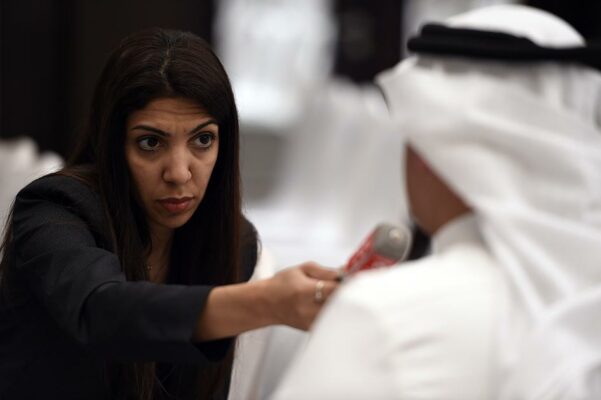The Covid – 19 pandemic has contributed to the deterioration of many rights in the Gulf region, including the entitlement to freedom of expression. After the 2011 pro-democracy protests, the Bahraini government has spent an incredible amount of resources towards incarcerating dissident voices, limiting content diversity, and spreading pro-government narratives in the media. However, its efforts have intensified ever since the beginning of the health crisis, which supplied an easy cover-up for governmental anti-democratic actions.

Indeed, the Bahraini government has continued its engagement in the pattern of summoning, interrogating, arresting, prosecuting, and imprisoning those who post online comments that cast the government in a negative light. For instance, Bahrain’s Office of Public Prosecutions announced in mid-March that it “will confront decisively (…) anyone who publishes or participates in the circulation of false news and biased rumors” during the pandemic, since circumstances demand citizens’ “support for the agencies and institutions of the state”. Yet, it is evident that the above-mentioned restrictions on freedom of expression cannot be justified, as they are in no way correlated to public health and therefore contravene international human rights law and standards that Arab countries have signed to abide by.
Most countries are signatories of the Human Rights Act, the International Covenant of Political and Civil Rights, and of the Arab League’s Human Rights Charter, which guarantee freedom of expression. Arab politicians also tend to include theoretical guarantees and protections for freedoms of speech and the media in their constitutions. Nonetheless, despite these legal guarantees, according to Reporters Without Borders, Bahrain is ranked 169th out of 180 countries in its annual World Press Freedom Index.
These results are justified by the systematic repression the country has enacted against journalists and media professionals every time they attempt to report popular dissent on paper. In fact, the first wave of arrests began in the wake of the massive protests of 2011, which reporters manage to cover. One of them, the photojournalist Hassan Mohammed Qambar, was sentenced to more than 100 years in prison for filming the 2011 happenings. Later, a second wave began in 2015 amid growing criticism of the war in Yemen and Bahrain’s participation in the military coalition led by Saudi Arabia. The final and fatal blow to press freedom came with the closure of Bahrain’s last independent media outlet, the daily newspaper Al-Wasat, in June 2017. Its editor, Mahmoud Al-Jaziri, was arrested in October of that year and was sentenced to 15 years in prison.
On the bright side, less than one year ago, Nabeel Rajab, a blogger who heads the Bahrain Centre for Human Rights, was released after international pressure. However, the situation for journalists is still extremely oppressive in Bahrain, with a total of 12 reporters currently detained. Moreover, since the start of the Covid-19 pandemic, these detainees have witnessed a new ban on medical appointments and family visits by prison authorities.
Among media professionals, women face widespread restrictions in practicing and expressing themselves. They are vulnerable to targeted efforts at intimidation, censorship, and allegations of defamation. Moreover, they face, as in other parts of the world, patriarchal stereotypes. Women journalists’ freedom of movement tends to be more restricted and policed than that of their male counterparts. Their access to sources and information is made more difficult on multiple levels. Finally, politicians and the public at large seem to be less tolerant of controversial views when they are expressed by women.
The most recent development in this ambit refers to the European Parliament resolution that was adopted on 11 March 2021 by 633 votes in favour, 11 against with 45 abstentions. The European Parliament further strongly deplores the de facto moratorium’s lifting on the use of the death penalty in Bahrain and calls on the authorities to introduce immediately a new moratorium on the use of capital punishment as a step towards its abolition. MEPs also demand that all human rights defenders and prisoners of conscience be immediately and unconditionally released.The Bahraini government must stop harassing human rights defenders and instantly lift the travel ban, MEPs stress. The country’s authorities must also guarantee that human rights defenders are able to carry out their legitimate activities under all circumstances.
Freedom of expression can be considered the main emanation of man within society. Its full recognition safeguards the stability of modern states and represents the foundation of democracy. Like all freedoms, it cannot fail to have limits, however, these limits cannot be defined by political or religious orientations, much less by authoritarian regimes, but only by respect for others.
SOURCES:
https://unesdoc.unesco.org/ark:/48223/pf0000266023?utm_source=rss&utm_medium=rss
https://www.amnesty.org/en/documents/mde04/3136/2020/en/?utm_source=rss&utm_medium=rss
The post DENYING THE RIGHT OF EXPRESSION: Patterns of impunity in Bahraini governance against civil society appeared first on Americans for Democracy & Human Rights in Bahrain.
This post was originally published on Americans for Democracy & Human Rights in Bahrain.